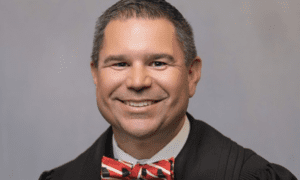For District 66 Rep. Virgil Fludd (D-Tyrone) the occasion was a town hall meeting held April 10 at Tyrone Elementary School. And it was a time to reflect on what he described as the highlights and “lowlights” of the 2012 session of the Georgia General Assembly.
Speaking to a group of nearly two dozen people in the school’s media center, Fludd said the highlights of the legislation session included the passage of a $19.2 billion budget, tax reform, criminal justice reform, the charter school amendment and metal theft legislation.
Fludd said the lowlights included issues such as drug testing requirements for TANF (Temporary Assistance for Needy Families) recipients, changes in the unemployment insurance program and no “Buy American” initiative.
Noting some aspects of the $19.2 billion budget for 2013, Fludd said there were no meaningful cuts and no cost of living increases. He said $104 million of the approximately $800 million in federal money associated with the mortgage fraud settlement was diverted for economic development purposes.
“It was discretionary and (the federal money) was used for economic development. I didn’t think that was appropriate. We have the fourth highest foreclosure rate in the U.S. Too many people are losing their homes,” Fludd said, adding that he did not vote in favor of adopting the budget.
Citing examples of the tax reform legislation, Fludd noted successful measures such as the elimination of sales and ad valorem taxes on vehicle purchases, the collection of sales taxes on online purchases, the elimination of sales tax on energy used for manufacturing, an increase in the income tax exemption to eliminate the marriage penalty, the approval of the back-to-school tax holiday and the cap on the exemption on unearned income for retirees at the current $65,000 level.
On criminal justice reform, Fludd said 2012 legislation gives judges more discretion for non-violent offenses, raises the threshold for certain felonies and revises sentencing guidelines for violations such as burglary, shoplifting and marijuana possession. New legislation also expanded drug courts and health courts, he added.
“We spend $1 billion a year in criminal justice costs,” Fludd said, explaining that Georgia’s rate is one of the four highest in the country.
On the upcoming referendum of charter schools, Fludd said the passage of the bill that will lead to the vote, “Gives the state the power to establish charter schools over the objection of local school districts.”
Noting that the Georgia Supreme Court last year struck down the previous law that allowed the establishment of charter schools, Fludd said, “I still believe the state has that authority. Ultimately the voters will decide in November.”
Fludd citing another legislative highlight referenced the metals theft legislation that strengthened penalties on thefts and expanded regulations on secondary metal recyclers.
Turning his attention to the “lowlights” of the legislative session, Fludd cited changes that included drug testing for TANF recipients. One test failure removes benefits for one month, two failures results in the removal of benefits for three months while a third failure means the recipient will lose benefits for one year, Fludd said.
“(In terms of percentages) there are fewer people on TANF using drugs than in the general population,” Fludd noted. “Our law was modeled after the Florida law and it’s likely to be challenged. The ACLU will file suit once the governor signs it.”
On unemployment reform, Fludd said the state borrowed $740 million from the federal government but, “The unemployment trust fund was not replenished during the good times.”
Now what we have, said Fludd, are benefits cut from 26 weeks to 14 weeks, or 20 weeks in some cases, and small increases for employers.
Fludd also expressed disappointment that the legislature did not move forward with a “Buy American” initiative.
Also making presentations at the town hall meeting were Fayette County Board of Education Chairman Leonard Presberg and, speaking on the upcoming regional transportation referendum, Metro Atlanta Voter Education Network representative Dave Williams.












Leave a Comment
You must be logged in to post a comment.